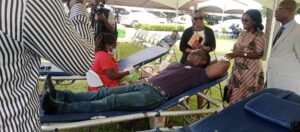The Medical Director and Chief Executive Officer of the Greater Accra Regional Hospital (Ridge) and a renowned Consultant Obstetrician Gynaecologist, Dr. Emmanuel Srofenyoh, has disclosed that the current maternal mortality rate in the country stands at 310 per 100,000 live births.
This, he indicated, is above the World Health Organisation (WHO) accepted standard of 70 out of 100,000 live births. He said the majority of these deaths are due to bleeding during or after childbirth.
Dr. Srofenyoh disclosed this at the launch of the 2022 Ghana Insurance Industry Blood Donation Campaign championed by the National Insurance Commission (NIC) in Accra. He therefore appealed for the general public to voluntarily donate blood to help stock the National Blood Bank.
The initiative formed part of the insurance industry blood donation month, and was on the theme ‘Donate Blood, Save a life: as You Do It For Someone, You Do It For Yourself’.
Last year, the NIC together with key industry stakeholders – i.e. the Ghana Insurers Association (GIA), the Insurance Brokers Association of Ghana (IBAG), the Chartered Insurance Institute of Ghana (CIIG), the West Africa Insurance Companies Association (WAICA), the Ghana Insurance College (GIC) and the ECOWAS Brown Card Insurance Secretariat – designated the month of August as Ghana Insurance Industry Blood Donation Month, during which all players in the insurance industry across the country will be expected to donate blood to help stock the National Blood Bank.
Dr. Srofenyoh said though the country needs 310,000 pints of blood annually, it can only supply 169,000 pints through blood donations and family replacement – leaving a shortfall of 141,000 pints of blood.
The renowned Gynecologist said women in labour, children, trauma and accident victims, and cancer patients need blood to survive.
Dr. Shirley Owusu-Ofori, Chief Executive Officer of the National Blood Service (NBS), in her remarks said there is a shortfall of blood donors in the country, explaining that although the W.H.O-recommended rate for blood adequacy ratio is 10 units per 1,000 people, the country has only 5.7 units for 1,000 people.
She said per the W.H.O recommendation, if one per cent of the country’s population donated blood there would be enough blood at the country’s various hospitals.
According to Dr. Owusu-Ofori, the country needs about 320,000 people – constituting one per cent of the population – to donate blood, but only about 170,000 donors are donating blood.
Dr. Justice Ofori, the Commissioner of Insurance, said the exercise forms part of the Insurance Industry Blood Donation Month and the country’s insurance industry players’ commitment to save lives.
He said as part of the programme, last year insurance industry players across the country donated 802 units of blood to help stock the blood banks.
Dr. Justice Ofori said this year’s blood donation will be carried out throughout the country, and the figure is expected to be higher compared to last year.











